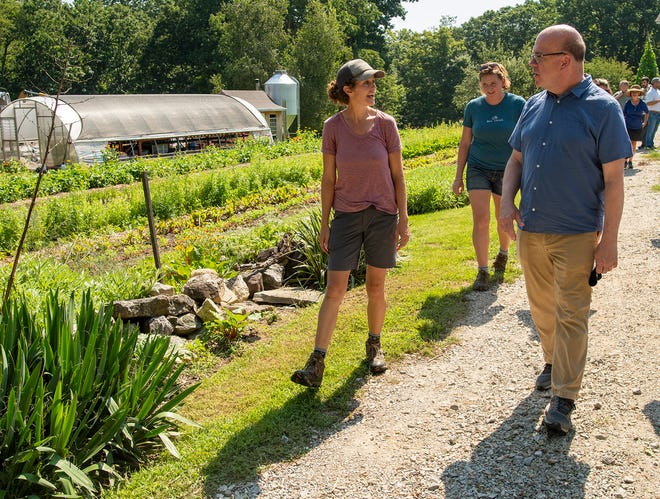McGovern highlights Central Mass. farms that take food benefits
Marco CartolanoTelegram & GazetteView Comments

LEICESTER — U.S. Rep. James P. McGovern said Massachusetts farms that accept benefits programs are an important part of fighting food insecurity during his tour of a Leicester farm Thursday.
The Worcester Democrat visited Cotyledon Farm as part of his two-day tour of farms in his district, his 11th annual farm tour.
McGovern also visited Growing Places in Leominster and Global Village in Grafton on Thursday. On Wednesday, McGovern toured farms in the western portion of his district, which has around 1,800 farms.
McGovern said that the farms he toured took Electronic Benefits Transfer (EBT) cards for payment from recipients of the Supplemental Nutrition Assistance Program (SNAP) and are involved in the Massachusetts Healthy Incentives Program (HIP), which puts money back in EBT cards when the recipient buys healthy food.
“Good food shouldn’t just be accessible to people of means. Good food should be accessible to everybody. It’s a fundamental human right,” McGovern said. “I love coming to these farms because I admire the skill it takes to be a farmer — I would probably last a minute-and-a-half on this farm before I said ‘enough.’ “
Programs such as SNAP and HIP help both residents who need to get nutritious food and farmers who get more business from the programs, McGovern said.
Winton Pitcoff, director of the Massachusetts Food System Collaborative, said that July was the first month when sales through HIP were over $1 million.
Amanda Barker, owner and operator of Cotyledon Farm, said food banks or food pantries will often purchase bulk food where producers may receive less money than from a direct purchase or a community-supported agriculture (CSA) arrangement.
“Direct-to-sales is the best possible relationship for both the consumer and the producer,” Barker said.
Cotyledon Farm is a 60-acre farm that specializes in mixed vegetables and perennial herbs and primarily uses a CSA model.
Recognition of New England and Massachusetts agriculture in Washington, D.C., had grown over time, McGovern said.
As a member of the House Committee on Agriculture, McGovern said that he has had to speak about the agricultural opportunities in the state, and he wants to bring Secretary of Agriculture Tom Vilsack to Massachusetts to hear from farmers about areas where they feel the federal programs need more flexibility in addition to possible new programs that better fit New England.

McGovern has also advocated for a new White House Conference on Food, Nutrition, Hunger and Health, which he said should include agriculture and farming.
While McGovern said the original 1969 conference made progress on food insecurity and created initiatives such as the Women, Infants, and Children (WIC) program, he said it had flaws that came from not bringing in a diverse array of voices that should be addressed in a future conference.
McGovern also spoke of wanting to not just involve the U.S. Department of Agriculture in a conference, but every federal agency such as the U.S. departments of transportation and energy as well as farmers in the private sector and nonprofits.
“We want there to be a more holistic view. We need to connect the dots. Because, quite frankly, the status quo isn’t good enough and there are too many people in this country who are hungry,” McGovern said. “It was not just because of the pandemic. Before the pandemic, 37 million people in this country were hungry. We all should be ashamed of that fact and we could do something about it.”
Ashley Randle, deputy commissioner of the state Department of Agricultural Resources, said that the state has supported funds for food insecurity grant projects.
Randle said that money secured infrastructure improvements for state farmers such as refrigeration. Farmers have also received more support than ever before from USDA programs during the COVID-19 pandemic, she said.
